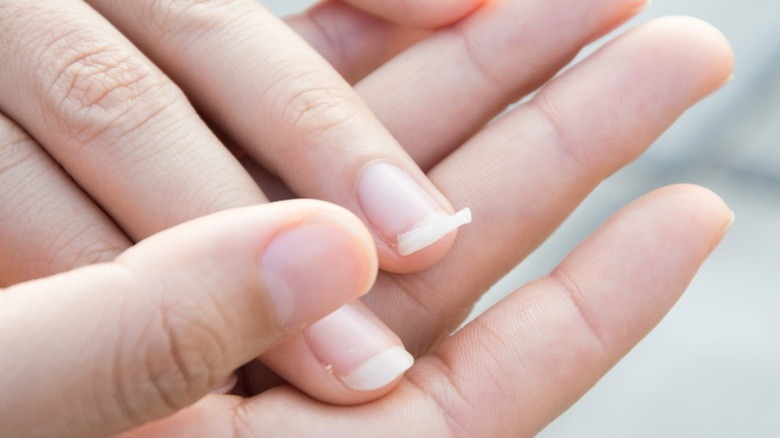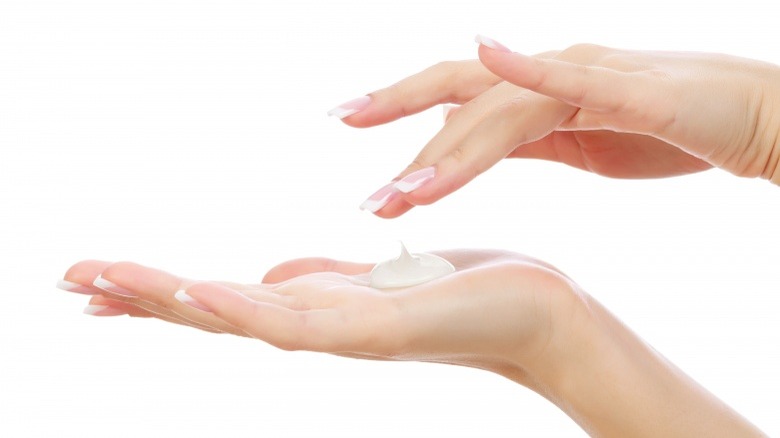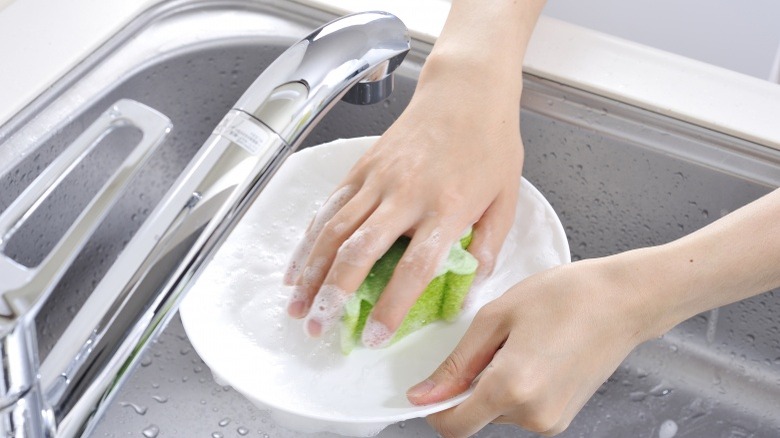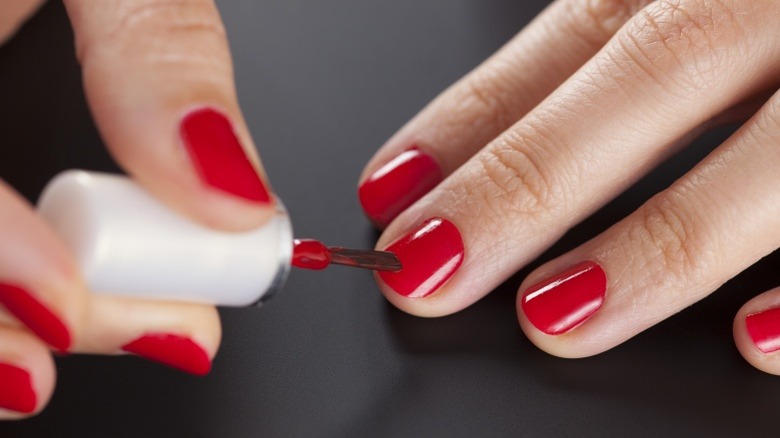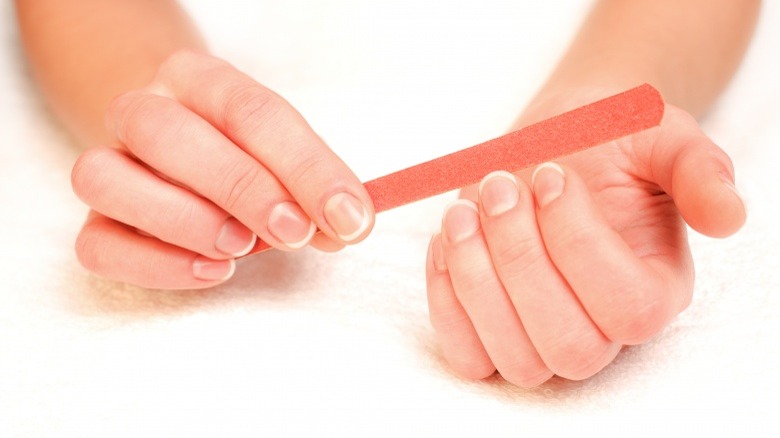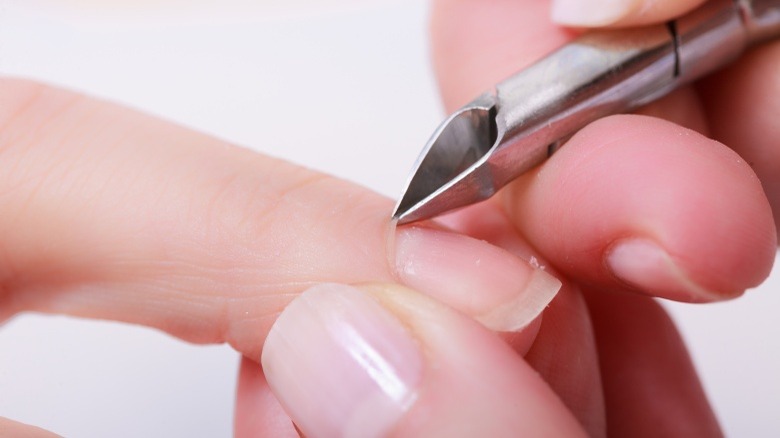Reasons Your Nails Keep Breaking
Broken nails have a way of ruining your day fast. We've all been there. You finally grow your nails out and finish them off with a perfect manicure, only to ruin the look when one nail breaks. And then maybe another. Now, the only thing left to do is file them all down (so at least they match) and wait for them to get long again. Talk about frustrating.
The thing is, that broken nail might be more that just an unfortunate turn of events — it may be a symptom of a bigger problem. I talked to a few experts to find out the real reason your nails keep breaking, and what you can do to make it stop.
It may be a sign
Broken nails happen to all of us every now and then, but if it's happening to you frequently, you may need to ask yourself why. According to Dr. Christa M. Tomc of Westlake Dermatology, the skin, hair, and nails can tell us a lot about what's going on with our bodies. They can also provide hints that our daily lifestyle habits and diets may not be up to par. If your nails tend to break as soon as they grow past your fingertips, it may be time to schedule a checkup.
Vitamin deficiencies
If your nails are weak and brittle, it may be a sign that your body is lacking important vitamins and minerals, explains Dr. Tomc. She says that in this case, a daily vitamin may be the answer to your nail issues. "One study showed a 25 percent increase in nail thickness with daily supplementation of biotin. She adds that it's "important to note that nutritional supplements are not regulated by the FDA, so always talk to your dermatologist when considering adding a vitamin to your diet."
Biotin, also referred to as Vitamin B7 or Vitamin H, can be found in foods like eggs, nuts, legumes, whole grains, bananas, and mushrooms. A healthy balance of these foods in your diet may help you strengthen your nails and prevent breakage. If you're not a big fan of those foods — or just can't work them into your diet — consider taking a supplement (after you've gotten the OK from your doctor).
Since there is no dependable lab test to prove you have a vitamin deficiency, it's usually diagnosed by your symptoms and observations of improvements after taking supplements. Biotin isn't the only vitamin deficiency that could be causing weak or brittle nails. If your body is lacking iron or vitamins B, C, D, or E, brittle nails may be a symptom.
Protein deficiencies
Protein is good for more than just your muscles. According to Dr. Tomc, not taking in enough protein can lead to breaking, brittle nails. Foods high in protein provide the most dietary nourishment for our nails, helping to make keratin, the protein that makes up our nails. Make sure you're eating plenty of fish, chicken, lean beef, poultry, eggs, beans, and skim or low-fat dairy to give your nails that protein boost they need.
"A well-balanced diet will ensure your nails' growth and strength," says Dr. Tomc.
Dehydration
Your whole body takes a hit if you're not drinking enough water, and your nails are not immune. In fact, dehydration is a major factor in many cases of brittle nails. Help your nails get the hydration they need from the inside by drinking adequate amounts of water — which is about nine cups a day for an adult woman.
Not enough moisturizer
Your nails don't just need moisture from the inside, they also need it from the outside — a lot. The best way to do this is by applying heavy moisturizers frequently throughout the day (seriously, you can't do this too much). Keep a moisturizer in your purse or car, and apply it whenever you think about it, but especially after your hands have been wet.
Too much water
I'm not talking about the water you drink (can you ever really have too much of that?), but instead, the water that comes in contact with your hands. According to CND education ambassador Kristina Saindon, having your hands in the water frequently, whether it's doing dishes, laundry, food prep, or something else, can take a toll on your nails. Solvents and soaps from cleaners also have a drying effect on your nails, which can lead to them more easily breaking. A simple solution to this issue is wearing gloves any time you do wet work. It may not be very pretty to don those gloves, but your nails will look a lot better the rest of the day.
Too much nail polish
All that polish sure is pretty, but it might be doing your nails more harm than good.
"Over time, treatments that abrade or dehydrate the nail plate can lead to micro trauma and breakage," said Dr. Tomc. But no worries, you can still wear that polish you love — just don't wear it for more than five days, and give your nails a few polish-free days to breathe in between manicures.
Filing the wrong way
Filing your nails may seem second nature, but there's a good chance you've been doing it all wrong — and causing your nails to break in the process. According to nail industry veteran Anita Zappacosta, executive director of OmegaLabs USA and Tropical Shine, the key is to file in just one direction. "Sawing back and forth tends to weaken the nail, ultimately causing breakage," she says.
The shape of the nail makes a big difference, too. "A square nail with a soft rounded corner is usually best for reducing the chances of nail breakage, and a nice oval works well too," Zappacosta adds. "Once the nail is filed too far from the nail walls on either side, you have created a weakness and the nail will crack or break much easier. Maintaining the nail wall on either side of the nail is most important."
Trimming cuticles
Basically, you should throw away that cuticle trimmer right now. Your cuticles were not meant to be cut.
"The cuticle is the barrier between the tough keratinized portion of the nail and the nail matrix," says Dr. Tomc. The nail matrix is a portion of the nail that extends from approximately the cuticle to the adjacent knuckle. The nail plate grows from the matrix. Inflammation to this area, which can be induced by aggressive trimming of the cuticle, can affect how the nail grows.
Nail industry veteran Anita Zappacosta, executive director of OmegaLabs USA and Tropical Shine, agrees. "The cuticle should never be cut at any time. It is closed skin that you risk opening, leaving the chance of infection." Instead, she offers this solution: "The cuticle should be softened with a warm soak (or cuticle cream or oil) and gently pushed back with a cuticle pusher or orange wood stick. Softening the cuticle area and a gentle push is the perfect solution to keep nails looking healthy and well maintained."
Texting and typing
As if you needed another reason to put down that phone. You know that clicking sound you hear when your nails hit that keyboard or screen? It's way more than annoying. According to Dr. Tomc, it could actually be harming your nails. "Any constant trauma can weaken the nail plate over time," she says. If you can hear your nails tapping against the your screen or keys when you type, either trim your nails or adjust your typing methods to prevent damaging your them.
Keep in mind that it takes a while for your nails to grow, so it may be a while before you start noticing stronger nails. "On average, an entire new fingernail will take six months to grow and a new toenail can take an entire year," explains Dr. Tomc.

